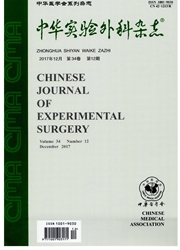

 中文摘要:
中文摘要:
目的观察缺氧对胰腺癌细胞E-cadherin表达的抑制以及侵袭性生物学行为的影响,探讨E-cadherin表达抑制的调控机制。方法分别在常氧和缺氧环境下培养胰腺癌细胞Panc-1,通过Western blot和Transwell技术对比观察E-cadherin表达的差异以及细胞侵袭能力的变化。体外转染表达HIF-α siRNA的真核表达载体pGenesil-1-HIF-1α以及对照载体,进一步检测沉默HIF-α之后,Panc-1细胞E-cadherin和细胞侵袭能力的变化。结果缺氧可以抑制Panc-1细胞E-cadherin的表达,并增强其在体外的侵袭能力。而通过RNAi技术沉默了HIF-α之后,则可以部分恢复缺氧微环境对Panc-1细胞E-cadherin表达的抑制,同时降低其在体外的侵袭能力。结论缺氧微环境中HIF-α的活化可抑制E-cadherin的表达并加强胰腺癌细胞侵袭能力。
 英文摘要:
英文摘要:
Objective To investigate the influence of hypoxia on E-cadherin and invasive behaviors of pancreatic carcinoma ceils. Methods The pancreatic cancer cell line Panc-1 was cultured under hypoxia and nomoxia. The expression of E-cadherin was detected by Western blot, and the invasion ability was determined by Transwell assay. The plasmid pGenesil-1-HIF-1α expressing shRNA targeted at HIF-1α gene and the control plasmid were transfected to silence the HIF-1α, and the E-cadherin and the invasive ability were determined accordingly. Results Hypoxia could suppress the expression of E-eadherin and enhance the invasive ability of Pane-1 cells. After silencing the expression of HIF-1α under hypoxia, the expression of E-cadherin could be enhanced and the invasive ability was inhibited. Condusion Hypoxia can promote the invasive ability of pancreatic cancer cells by activating HIF-1α and suppressing E-cadherin. The therapy targeting HIF-1α may provide a new weapon for overcoming pancreatic cancer.
 同期刊论文项目
同期刊论文项目
 同项目期刊论文
同项目期刊论文
 Blockade of sonic hedgehog signal pathway enhances antiproliferative effect of EGFR inhibitor in pan
Blockade of sonic hedgehog signal pathway enhances antiproliferative effect of EGFR inhibitor in pan Establishment of clonal colony-forming assay for propagation of pancreatic cancer cells with stem ce
Establishment of clonal colony-forming assay for propagation of pancreatic cancer cells with stem ce 期刊信息
期刊信息
